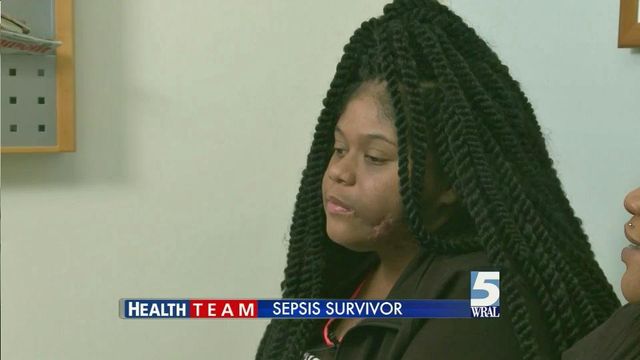Teen lucky to be alive after oral surgery results in sepsis
Most infections heal, but for a Burlington teenager, an infection went quickly out of control following wisdom tooth surgery.
Posted — UpdatedMost infections heal, but for a Burlington teenager, an infection went quickly out of control following wisdom tooth surgery.
Times are happier for Tykitha Isley and her 15-year-old daughter Ayanna Smith as they come for their last checkup with UNC thoracic surgeon Dr. Benjamin Haithcock.
“He saved my life,” Smith said of Haithcock.
Smith and Isley are also thankful for a large team of physicians and staff in pediatric clinical care, where Smith stayed for 46 days. Her problems began as she recovered from wisdom tooth extractions, with what first seemed like normal swelling around the jaw.
One night, though, Smith woke her mother up in the middle of the night with severe swelling around her neck and mouth. She ended up in the UNC emergency department when an infection had entered her blood stream in a condition called sepsis.
Sepsis is a life-threatening complication of infection that can lead to septic shock and death. Antibiotic resistant bacteria are often the root cause of infections that trigger sepsis.
“Sepsis is really the body fighting against an infection and doing it in a way that actually affects organs. Organ systems shut down,” said Dr. Tina Schade Willis with UNC Pediatric Critical Care.
Standard treatments failed to bring the infection under control.
“That’s why we called for the possibility of putting her on a heart, lung bypass machine,” Willis said.
“What that means is that we pretty much bypass her heart and her lungs to allow her heart to rest,” Haithcock.
The machine, called ECMO, allowed staff to focus on fighting the infection. Ayanna’s mom remembers weeks of uncertainty. Smith recovered, but remained in rehabilitation for a few weeks, feeling homesick.
“I missed school, I just missed a lot down in Burlington while I was up here,” Smith said.
Help with tutors helped her catch up with school work, so Smith will rejoin her classmates in late August.
If a person has an infection with a fever greater than 101 degrees, a fast heart rate and shortness of breath, they could be developing sepsis and should seek emergency treatment.
• Credits
Copyright 2024 by Capitol Broadcasting Company. All rights reserved. This material may not be published, broadcast, rewritten or redistributed.





